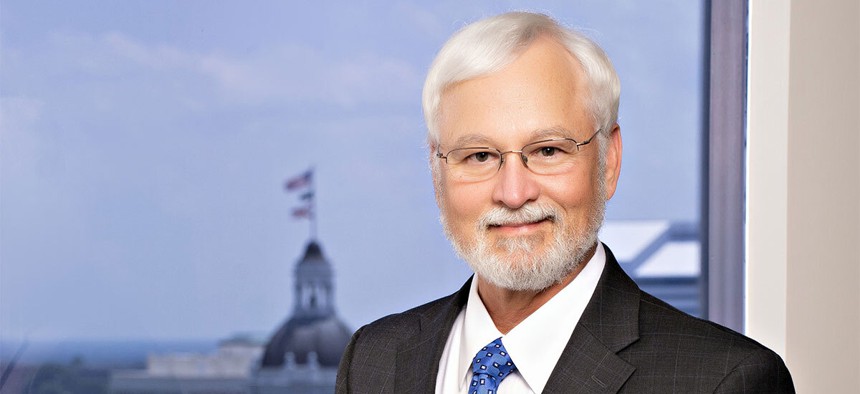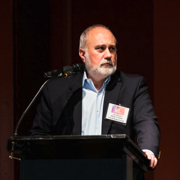Personality
Five Questions with former Florida Supreme Court justice Ricky Polston
After a brief stint at Citizens Insurance, Polston tries his hand at Shutts & Bowen.

Ricky Polston. Photo provided by Shutts & Bowen
Ricky Polston, a former Florida Supreme Court justice, had a good reason to leave the bench years before he reached the state’s mandatory retirement age of 75: A state pension “is good but it's not that good,” he told City & State with a laugh.
He stepped down from the bench in March to become general counsel and chief legal officer at Citizens Property Insurance Corp., the state-backed insurer of last resort. But within a few months, the Shutts & Bowen law firm announced that he would join the Tallahassee office as a partner. The 67-year-old father of 10 will head the firm’s Constitutional Law Practice Section.
Ben Gibson, the firm’s Tallahassee office managing partner, said it has “over 30 practice areas and with someone of the caliber of Justice Polston coming in, he’s going to be able to provide value all across our firm.” Polston spent 15 years at the Supreme Court and was a First District Court of Appeal judge before that, starting in 2001.
City & State Editor-in-Chief Jim Rosica spoke with Polston about his new job last week; what follows are five of the questions asked. Questions and answers have been edited for clarity and brevity:
Was there one case that came before you as a judge that was the most challenging?
I can tell you there were two cases that really affected me. Both were at the First District Court of Appeal, where you hear more kids' cases, where they've been abused and neglected and things happened to them. … I remember a case where a kid had been abused and it really just, just affected me. And in a personal way, it just really broke my heart about what had happened.
And then there was another one where basically a kid who was barely an adult, had a couple of priors and went into some fast food chain and unfortunately used a weapon to hold the place up and got, you know, 20 bucks or some very small amount. And because of the way the (mandatory) sentencing worked, it just totally wrecked that young man's life. And it broke my heart what a bad choice that he had made for himself resulted in just a total destruction of his life. That just really weighed on me.
Why did you leave the bench when you did?
I have a working life that is rapidly coming to a short runway and I would like to be able to better provide for my family in the rest of my working career. … And so when (Citizens’ CEO) Tim Cerio called about working there, it was a good opportunity for me to do that. And then Shutts & Bowen presented another opportunity that I just could not pass up, to be able to work on the kinds of cases, to work with this firm that I have a deep respect for, and to be able to further my career in a way, hopefully, to end it with them, was too good of an opportunity to pass up.
… There are a lot of legal issues with Citizens that come up routinely and it's an interesting legal environment for a general counsel and chief legal officer to deal with. When I left, one of the senior executive team members came up to me and said, ‘Ricky, you know, I'm excited for this opportunity for you. I am sorry to see you go. Because I feel like you fit here like a glove.’ I felt the same way. So I did not leave Citizens because I was somehow surprised by anything or disappointed in any way. It was a great opportunity, but it was (also) too good of an opportunity to pass up to be able to go to Shutts. And I will say that Tim and the senior leadership (at Citizens) and the board, everyone was so gracious with my going out. So I cannot say enough good things about the folks there and the company.
What kinds of cases will you specialize in at Shutts?
The kinds you read about in the paper, hot button issues and things like that. But also, the Florida Constitution, as you know, has a lot of different provisions dealing with taxation, property tax, a lot more mundane constitutional law cases are heard all the time at the DCA level and the Florida Supreme Court and they are not those you necessarily see catching the headlines.
I've had a lot of varied experiences in both practicing law and in seeing cases come before me at the first DCA and the Florida Supreme Court. And I've had varied experiences in commercial litigation, contract disputes, insurance matters, and I expect to be doing work in all those different types of categories that may come my way. So it's not just strictly constitutional law cases that I expect to be working on, although those are my favorite.
Obviously, there's been a lot of talk about the politicization of the courts. What do you say to those who complain about that?
I think that the justices on the court work hard at trying to faithfully rule on the law, on the cases that they're presented, where they look at the rule of law and they're trying to faithfully apply it. And that's what they do. … They don't look at the result that they desire and then try to back into the analysis of the law. They analyze the law and then the outcome is the outcome.
… I always tried to faithfully apply the law. That was my judicial philosophy, not to make the law, (but) to apply the law. And I tried every day that I woke up to faithfully apply that judicial philosophy.
You grew up in the rural Panhandle, went to a small college and got your associate’s degree, and eventually became a justice of the state's highest court. Do you use your life story when you talk to aspiring law students about what they can achieve?
Sure. I had the opportunity to speak at a recent graduation of Chipola (College, where he attended before Florida State) … and in law school, I would do the same. I would ask where everyone was from and find out. I would tell them my story routinely, no matter what course I taught the first day, I would always tell them my personal story and then I would ask them theirs and we'd go around the room and give them an opportunity to speak.
One of the things I would always (joke) about was that I've got too many kids, and then they kind of smirk and giggle a little bit. And I'd say I have 10 kids. And they'd go, wow, that is too many, you know? And then I would tell them that we had adopted six, and then their demeanor would usually change. They're a little more receptive to the idea that we'd adopted some kids, you know?
Contact Jim Rosica at jrosica@cityandstatefl.com and follow him on Twitter: @JimRosicaFL
NEXT STORY: This week’s biggest Winners & Losers
